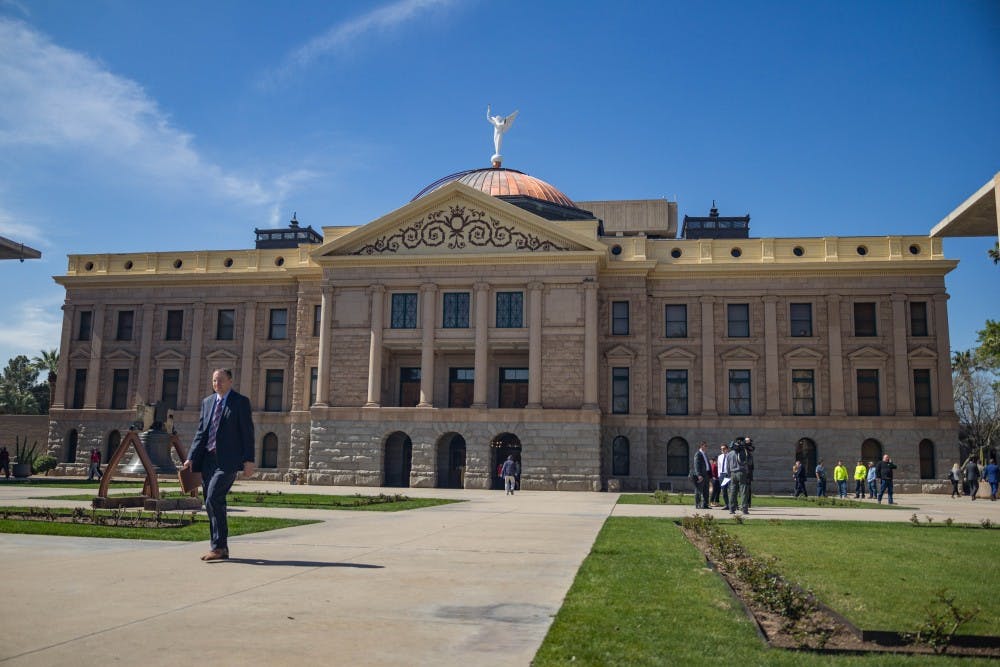The controversial minimum wage bill that would impact full-time students working part-time jobs has moved past its initial roadblock in the Arizona Senate Commerce Committee.
House Bill 2523, also known as the Youth Employment Act, would allow businesses in Arizona to pay full-time students who work 20 hours or less per week to be paid the federal minimum wage. The federal minimum wage currently rests at $7.25, which is $3.75 less that Arizona's current minimum wage of $11.
On March 28, the Senate Commerce Committee voted in support of the bill with a 4-3 vote along party lines, with one abstain from Sen. David Livingston (R-Peoria), who was not present.
The bill's movement through the committee comes after weeks of political roadblocks trying to get it through the Senate. In the middle of March, the bill was placed on hold in the committee after Sen. Tyler Pace (R-Mesa) raised concerns over parts of the bill.
Read more: Controversial student minimum wage bill hits a roadblock in the state Senate
Pace said one of the reasons why the bill was stalled was because he wanted to add an amendment.
"If the bill makes it to floor ... it would have to have an amendment on it per my agreement, and Representative (Travis) Grantham has agreed to work with me on an amendment that I would feel comfortable with," he said.
Without the amendment, Pace said he would not vote in support of the bill if it reaches the Senate floor.
One of his main concerns, he said, was that the bill uses enrollment as a full-time student as a determining factor for deciding who falls under its jurisdiction. He said he personally feels that the current bill, as written, would disincentivize people from going to school.
Because of this, Pace said his proposed amendment would change the bill's focus on full-time students under the age of 22 to teenagers who are under the age of 18, financially dependent on their parents and childless.
When the bill was introduced, several ASU student organizations spoke out against it, saying that it would negatively impact students who lack a financial safety net.
Read more: Bill allowing students to be paid below state minimum wage faces pushback
Katey Higgins, a sophomore majoring in marketing with a minor in Spanish and an Arizona native who has previously worked multiple part-time jobs, said she thinks it is "insane" that the bill is moving though the state legislature.
"It's just to take advantage of this workforce in this time of development and trying to figure out what they want to do with their life," Higgins said.
While one of the main talking points in support of the bill revolves around its goal to create more employment opportunities for Arizona youth, Higgins said that the reality of the situation doesn't warrant this type of legislation.
She said that it has not been hard for her and her friends to find a part-time job, with the exception of more temporary summer positions, saying that one of her friends once went into a pizza shop and was offered an interview on the spot by the owner. The friend got the job and worked there for two years, Higgins said.
As a full-time student who has worked part-time jobs in the past, Higgins said that she and many of her peers are holding these jobs to help pay for their education, not just to make extra pocket money.
"Because I have a limited amount of funds for my college experience, I had to go in, and I had to work summers and I had to work as much as I could," she said. "It's not just some silly part-time job for pocket cash."
Sen. Sean Bowie (D-Ahwatukee), who is also part of the Senate Commerce Committee, voted against the bill in the committee's last meeting.
Bowie said that he believed the bill to be unconstitutional because it goes against the most recent minimum wage law that was voter-approved through Proposition 206 in 2016.
He added that he doesn't believe the new minimum wage bill will fix the problem it intends to.
"It was the wrong way to approach this problem that we have, that sometimes it's hard for young people to find work," Bowie said. "I think the argument of 'Well, we can allow employers to pay young people less' is the wrong way to approach it."
Bowie also said that the bill discriminates against young people solely based on their age, which he said is not allowed under Arizona law.
"We have statutes in place at the state level where age is a protected class," he said. "The same statute says that you can't discriminate against someone because of their gender, or their race or their disability."
Both Arizona law and federal law prohibit employment discrimination "on the basis of race, color, religion, sex, age, disability or national origin," according to the State Bar of Arizona's website.
Bowie suggests that instead of cutting young people's wages, the state should instead invest in education, workforce development or job training programs.
Higgins said that even with the amendment that Pace is pushing for, she would not support the bill.
"I feel like it just shouldn't be a thing," she said. "Under 18 or not, it still will be devaluing someone's work because of their age."
Reach the reporter at mzhao49@asu.edu and follow @michelle_zhao23 on Twitter.
Like The State Press on Facebook and follow @statepress on Twitter.




